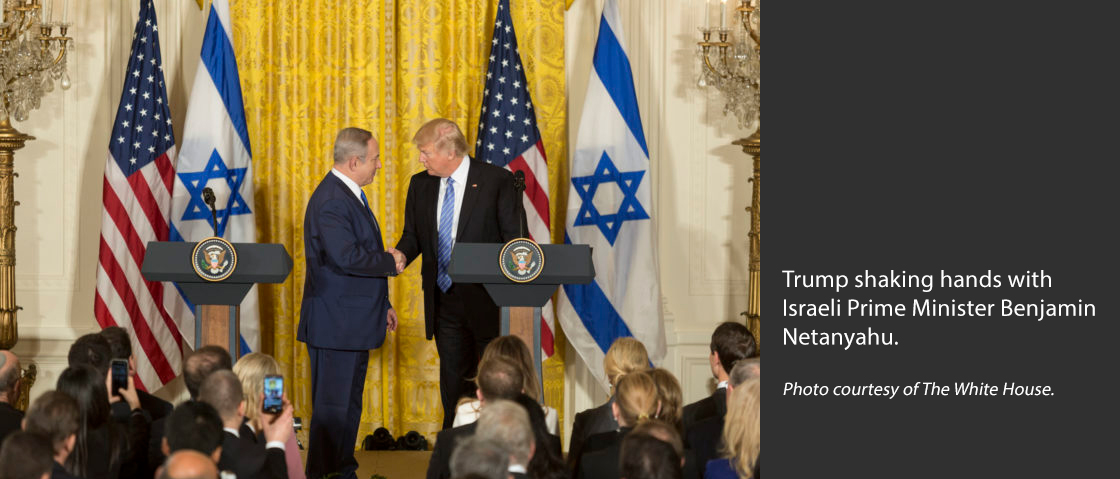This week, President Trump unveiled his so-called “deal of the century” to resolve the Israeli-Palestinian conflict. Crafted by his son-in-law Jared Kushner, Trump’s deal is the latest in a long line of solutions proposed by American presidents to end the generations-old conflict, from the Reagan Plan to the Clinton Parameters. Though each plan is different—a different border here, a change in how settlements and refugees are treated there—they all have one thing in common: they all failed. And Trump’s plan—which centers on extending Israeli sovereignty over the West Bank and providing substantial financial incentives for Palestinians—will also fail to be accepted by both parties, will not resolve the conflict, and will be supplanted by another version from a subsequent president. What’s important but often overlooked about Trump’s “deal of the century,” however, is that it represents a different understanding of the Israeli-Palestinian conflict and how to resolve it: a shift from collaborative negotiation to coerced victory.
Most students of the Arab-Israeli conflict envision a peace process wherein the two sides, each with clashing but legitimate claims to territory, autonomy, and past injustices, are brought together by a third-party guarantor to negotiate a compromise that neither side will love, but both will agree to live with. This “negotiated settlement” paradigm was the approach of Camp David, Oslo, Taba, and Annapolis—and is the favored approach of the international community. At Boston College and MIT, where I currently teach classes on these topics, most of my students cannot understand how Trump’s deal—which heavily favors the Israelis and has not involved discussions with the Palestinians over the past two years—could possibly end the conflict.
But there is another model of conflict resolution, which Trump’s deal happens to represent. In this “clear victory” paradigm, conflict is resolved by one side winning and largely imposing its terms on its rival. In this scenario, the roadblocks to peace and stability are not mutual mistrust or the inability to find a balanced blueprint, but rather an unclear winner on the battlefield or at the negotiating table. This leads to uncertainty about who could emerge victorious, thus encouraging both parties to continue the struggle. As Geoffrey Blainey argues, “wars usually end when the fighting nations agree on their relative strength, and wars usually begin when fighting nations disagree on their relative strength.” Indeed, Monica Toft shows that in civil wars, victory by one side is “more likely to secure the peace than are negotiated settlements.”
From the perspective of the long-dominant Israeli right, this conflict has not been resolved because the Palestinians have not faced up to the fact that they have lost. They haven’t had to, because, as the argument goes, the US, Arab states, and Europeans have given the Palestinians hope that, despite their relatively weak position, these powerful third parties will help turn the tide against Israel, either via diplomatic, economic, or legal pressure. Trump’s deal breaks with this tradition. It presents the Palestinians with the Israeli right’s vision for the end of the conflict on borders, Jerusalem, settlements, and refugees, coupled with a loss of historic support from the US and prominent Arab governments. Neither was ever a consistent or effective champion of the Palestinian cause—as most Palestinians will tell you—but having the American president and a new generation of prominent Arab leaders endorse Trump’s deal pulls key legs out from under the wobbling stool of Palestinian international support. Implicitly and explicitly, the Trump deal is signaling to the Palestinians that now is the time to face reality.
Of course, the deal has not and will not be accepted by the Palestinians. On top of its significant imbalance, research shows that the Palestinians are less likely to make concessions on issues like refugees when offered money—which is the main incentive the Trump deal provides them—instead of symbolic recognition of their claims. Furthermore, the questionable timing and rollout of the plan—amidst Trump’s impeachment trial, Israeli Prime Minister Benjamin Netanyahu’s looming corruption trial, and reelection campaigns for both— suggest that it’s as much or more about shoring up domestic support for Trump and certain Israeli leaders than it is about ending the conflict.
That doesn’t mean the deal is irrelevant, though. “Clear victories” are often implemented unilaterally—and whether it’s the unilateral annexation of Jerusalem in 1967, the unilateral pullout from Gaza in 2005, or the unilateral expansion of settlements from 1967-present, this has been Israel’s approach for some time. A unilateral annexation of the Jordan Valley or settlements elsewhere in the West Bank would therefore represent a continuation.
What’s significant about the deal is that it represents a paradigm shift in US policy, at least under Trump, from one model of conflict resolution to another. This shift is evident in other areas of foreign policy, too, including Trump’s pullout from the Iran nuclear deal and attempts to impose his desired terms there via “maximum pressure.”
What the “clear victory” model fails to take into account, however, is that the facts on the ground are not entirely in the Israelis’ favor. Demographic realities and the Palestinians’ growing shift away from support for a two-state “negotiated settlement” towards a movement built on citizenship, equal rights, and a one-state reality may be waiting for Trump and the Israelis on the other end of the “deal of the century.” If such a Palestinian movement coalesces as both sides move on from their old models of negotiation, the Israelis may, in Trump’s terms, finally “get tired of winning” when they see what their “clear victory” has won them: a single state with a significant Palestinian population that no longer wants to negotiate with Israel as outsiders, but become part of it, as citizens.




